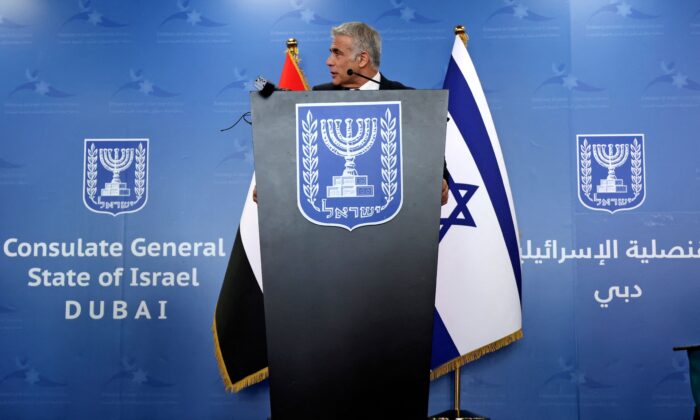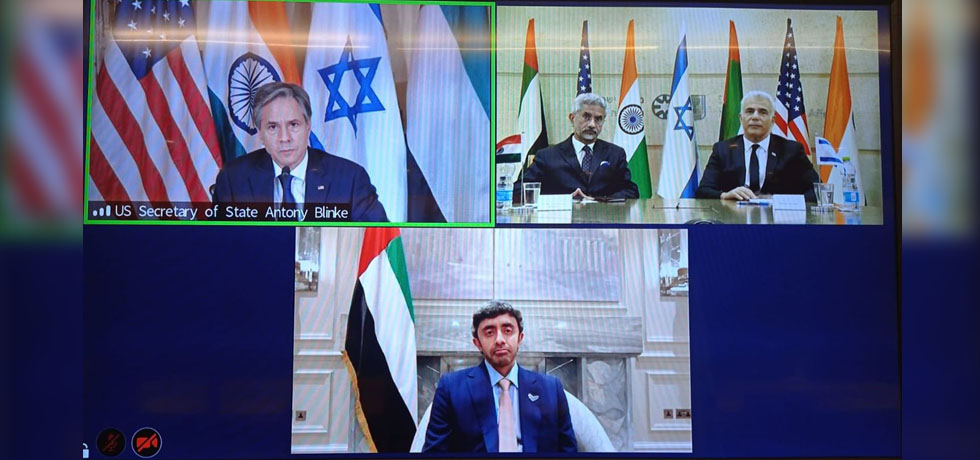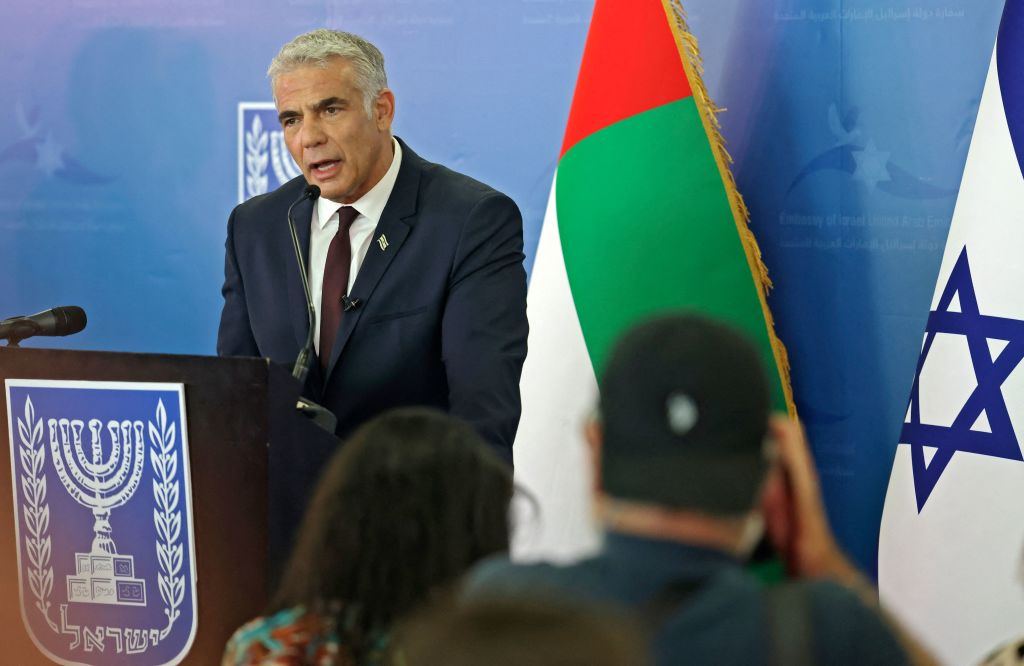
NEW DELHI鈥擣irst there was a quadrilateral security alliance or “quad” between the United States, India, Japan, and Australia in the Indo-Pacific. Now there’s buzz about a Middle East quad between the United States, India, Israel, and the UAE.
What has been described as a “preliminary” and informal meeting between the foreign ministers of the four nations on Oct 18 was partly in-person and partly virtual.
Intending to enhance political and economic cooperation between the four nations in “the Middle East and Asia” Secretary Blinken spoke with Emirati Foreign Minister Sheikh Abdullah bin Zayed, Indian Foreign Minister Dr. S. Jaishankar, and Israeli Foreign Minister and Alternate Prime Minister Yair Lapid.
Jaishankar who’s on a five-day, first trip to Israel聽said in a message on Twitter that the forum will work on “economic growth and global issues” and said there’ll be an “expeditious follow-up.” He and Lapid joined the forum in person.
U.S. Department of State said the four foreign ministers discussed political and economic cooperation in the Middle East and Asia including on issues pertaining to trade, climate change, energy cooperation, and maritime security.
“Secretary Blinken and the Ministers also discussed people-to-people ties in technology and science, and how to support global public health in relation to the COVID-19 pandemic,”聽the U.S. Department of State said in a statement聽released on Monday.
Experts told Pezou that the informal forum, which is being dubbed as the new quad or the Middle East quad among the analysts and the media, is a development of the bilateral relations between the four countries and is poised for larger regional and global influence.
“ emerging close ties between the U.S., Israel, UAE, and India, as a group or ‘quad’ is important because it cements together key relationships of countries that share interests and which span a vast area of the world,” Seth J. Frantzman, a Middle East Analyst and the聽author of the book, “Drone Wars: Pioneers, Killing Machines, Artificial Intelligence and the Battle for the Future,” told Pezou in an email.
Frantzman described it as a “preliminary and groundbreaking meeting” and said the four countries already enjoy close bilateral relations and the new forum will help them share potentially important policies.
“This can be through technology and trade but also could relate to security and other interests. Because these countries are also in other partnerships regionally they can help influence a larger network of partnered countries from the East Med to Australia and Asia,” he said adding it needs to be seen how the four countries build upon this first meeting.

Abraham Accords
Monday’s forum follows last year’s Abraham Accords that marked the first public normalization of relations between any Arab nation and Israel.
Abraham Accords is a joint statement between the United States, UAE, and Israel signed last year on Aug. 30 and is now an umbrella term for the Israel-UAE normalization agreement and Bahrain-Israel normalization agreement.
“ Secretary reiterated the Biden Administration鈥檚 support for the Abraham Accords and normalization agreements and discussed future opportunities for collaboration in the region and globally,” said the State Department.
Esra Sarim, a France-based international security analyst told Pezou in an email that after the Abraham Accords were signed in the “Trump Era,”聽 the UAE,聽as a key energy supplier, became a “reliable partner” for both the United States and Israel.
“India and Israel have already had a close relationship for years. y have robust cooperation in the defense industry and this close relationship is always encouraged by the U.S. government as well as Israel鈥檚 relations with the UAE,” said Sarim.
Hamid Bahrami, a Glasgow-based middle east analyst told Pezou that the United States wants to use the forum to transfer its “security role” to an “Arab-Israeli block.”
“ threat is currently from the Iranian regime and the growth of Islamism, which threatens Arab states. significance is that both Israel and Arabs have found common interests as well as the same enemy. Iranian regime views it [Abraham Accords] as a military alliance against itself. mullahs’ regime has today been isolated and it seems it seeks to go closer to China and Russia,” said Bahrami.
Frantzman, however, said that the four nations share broader interests in “regional stability,” but he said he doesn’t see the group sharing common interests regarding Iran.
“Israel is concerned about Iran’s drive for a nuclear weapon and its destabilizing role in Gaza, Syria, Lebanon, and Iraq. India doesn’t appear to have any qualms with Iran, and the UAE prefers stability over confrontation. This quad doesn’t appear to share interests regarding Iran,” said Frantzman.

New Quad and China
Experts said the new alliance will help maintain the United States presence in the Middle East and South Asia after its withdrawal from Afghanistan and will also help create a regional balance against China and Russia.
Sarim said Monday’s forum has come after the first trilateral partnership and an economic agreement between India, UAE, and Israel early this year. This agreement is about Israel producing a robotic solar cleaning technology in India for a project in the UAE.
“This formation was specially made just after the AUKUS defense agreement between Australia, Britain, and the United States. Because, through these agreements/alliances, the U.S. administration that had to leave Afghanistan aims to strengthen its axis and adopt a strong approach towards both Russia and China in order to maintain its position/presence in the Middle East and Southern Asia,” said Sarim in the email.
Aukus is widely seen as a pact to counter China and involves Australia for the first time ever building nuclear-powered submarines with the technology provided by the United States.
“We鈥檙e taking another historic step to deepen and formalize cooperation among all three of our nations because we all recognize the imperative of ensuring peace and stability in the Indo-Pacific over the long term,” said President Joe Biden after the creation of Aukus.
Bahrami said the new quad is part of the United States’s strategy and a larger Western strategy to form a wide and united camp against China.
“Indeed, the world will see a new world order in the next decade,” he said adding that the new forum and the other bilateral agreements between these countries are to counter China’s larger agendas.
In an analysis earlier for the Jerusalem Post, Frantzman added Greece, France, Cyprus, Bahrain, Egypt, and Jordan to the list of “like-minded countries” as an extension of the new Quad.
“Greece and Cyprus have no negative issues with China. On the other hand, Greece and Cyprus are increasingly close to Israel on many interests and also working closely with the U.S. Greece and Cyprus likely share concerns about Turkey’s aggressive behavior. re are good reasons for Greece and Cyprus to want to be linked to India and they already have close ties to the UAE,” he later told Pezou.
Bahrami said Frantzman is right about the reach, and it can be expanded to other countries, which have the same interests.
“However, all these countries will finally need to choose which sides they are going to stand on in the new international division in the coming years. For instance, the U.S. will need to make clear for Pakistan which side Islamabad wants to stand on. If Pakistan still provides China with a route reaching the Indian Ocean, that means Pakistan is in China鈥檚 (asymmetric camp). Or if Israel still wants to have a normal relationship with China, it threatens the U.S. plan,” he said.
Sarim said that in response to these agreements it’s likely that “Iran, Pakistan, Russia, China, and even Afghanistan” will make multiple economic and security deals in the coming time.
Pezou : A Middle East ‘Quad’ Begins to Develop